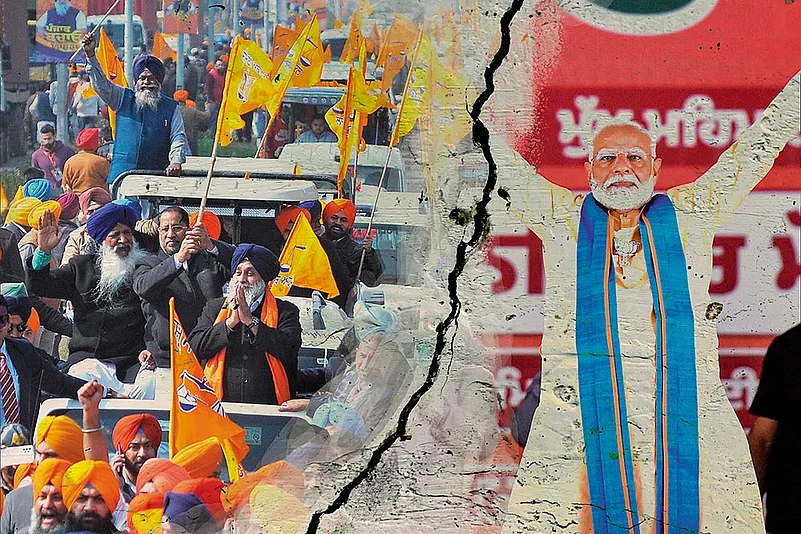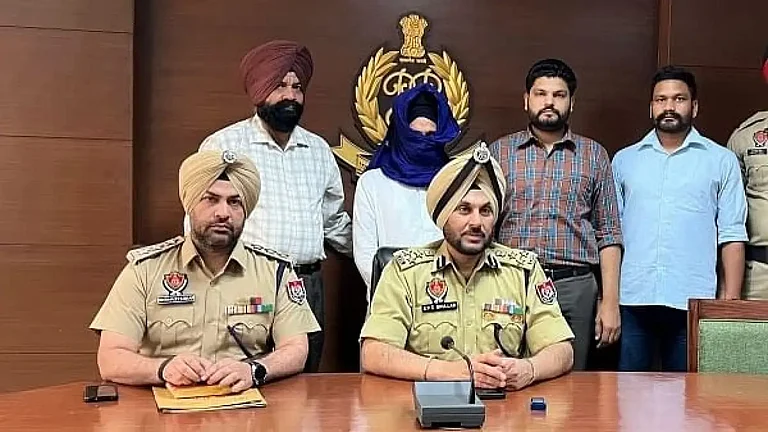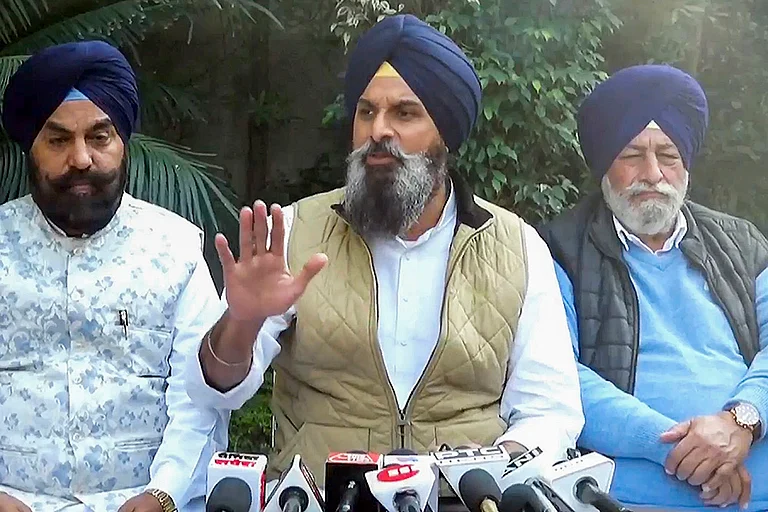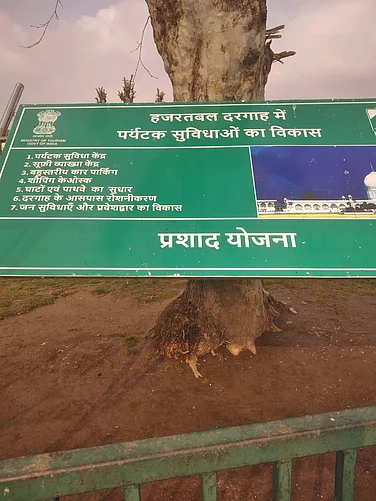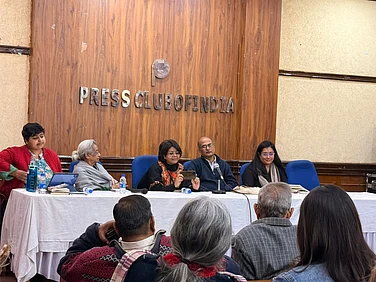In June 2022, the Shiv Sena, a traditional Bharatiya Janata Party (BJP) ally in Maharashtra, faced a backbreaking revolt.
Eknath Shinde—a key party member led an uprising against the leadership of then Chief Minister and Sena supremo Uddhav Thackeray, prompting a vertical split in the powerful regional political force. The split not only resulted in the collapse of the incumbent government, but also led to the formation of a government under Shinde with the BJP’s backing.
Now, Punjab appears to be waking up to political developments on similar lines.
In less than 100 days after elections, tie-up talks failed between the Shiromani Akali Dal (SAD) and the BJP. SAD, one of the BJP’s oldest allies in Punjab, chose to go solo in the Lok Sabha polls. However, it won just one of 13 seats. The party, which has existed in the state since 1920 and was once described by SAD patriarch, the late Parkash Singh Badal, as having a nau-mass da rishta (relationship of the nail with the skin) with the BJP, is now facing internal turmoil that threatens to rip it from within.
Amidst growing unrest in the SAD following its setbacks in the Lok Sabha polls, as well as the 2017 and 2022 state assembly polls, the party is now embroiled in serious dissent. A revolt against the leadership of Sukhbir, Parkash Singh Badal’s son, also appears to be brewing. Political observers are surprised by the timing of the revolt, which occurred at a time when Punjab politics is undergoing a dynamic transition and radicals are attempting to decisively capture political space.
60 prominent SAD leaders, who assembled in Jalandhar on June 25, passed a resolution asking Sukhbir Badal to step down from the party’s top post because of his failure to address internal dissent, poor performance in the polls and inability to adapt to the changing political landscape of Punjab politics.
Those calling for his resignation include individuals who had worked closely with Parkash Singh Badal but felt sidelined after Sukhbir Badal took over the party’s reins and began running affairs according to his own whim.
In a counter move, a resolution passed by the SAD Working Committee on June 26 expressed full faith in the leadership of Sukhbir Badal, but avoided making any reference to the BJP and its role in the crisis. The working committee termed the dissent a dangerous attempt to disturb peace and communal harmony and to blame it on Sikhs.
“Peace in Punjab is essential for the progress and prosperity of people in Punjab,” the resolution said.
Harsimrat Kaur Badal asserts that the entire SAD is united behind her husband Sukhbir Badal, but also claims that the BJP is at work to raise internal strife.
But there is more to the ongoing foment.
Speculation is also rife that the BJP, which has also contested the Lok Sabha poll and improved its vote share from 9.6 per cent in 2019 to 18.5 per cent in the 2022 state polls, is exacerbating the internal dissent within its erstwhile Punjab ally.
However, SAD’s lone MP, Harsimrat Kaur Badal, continues to assert that the entire SAD is united behind her husband Sukhbir Badal, but also claims that the BJP is at work to raise internal strife within her party.
“Some people in the BJP and also the central government, are trying to break the SAD. There is a group within the Akali Dal that has been active for quite some time now. They have found an opportunity to raise the leadership issue. They want to do the same as they did in Maharashtra. The SAD is fully united and they (opponents of Sukhbir Badal) are going to fail badly. Out of 117 leaders, only five are against Sukhbir Badal, while 122 are standing with the party,” she said.
Harsimrat Kaur Badal said some of the rebels, who are asking for Sukhbir Badal’s resignation, have been with the BJP and fought elections on BJP tickets. “Their game plan is well exposed. The people will not accept them,” she maintained.
Jagroop Singh Shekhon, a political science professor at Guru Nanak Dev University, Amritsar, says the real problem afflicting the SAD is the concentration of power within one family.
The Badal clan continues to dominate, not allowing space for other leaders, he claims. Dissension in the SAD began much earlier but has now manifested after the party’s traditional vote bank slipped away from strongholds, particularly in the Malwa and Doaba regions.
“I don’t agree that the BJP could be behind it. In fact, it’s in the favour of the BJP and the central government to not weaken the SAD. That’s because, if the Akalis lose their political space in Punjab, the radicals will get stronger. The SAD may be politically down, but socially they are still strong,” he claimed.
The BJP, rather, has its own roadmap for Punjab to strengthen its organisational structure. The induction of Ravneet Singh Bittu, a former two-time Congress MP in the Union cabinet despite losing his Ludhiana seat in the recently concluded general election, is also a move to build up its strength in the northern state.
In previous forays into Punjab’s political pastures, the BJP had mainly shared power with the SAD when Parkash Singh Badal was at the helm. However, with a new generational change and the entry of several new faces primarily from the Congress, the BJP is now aiming to capitalise on its individual strengths.
Naturally, there are upheavals happening within the Akali Dal triggering the current impasse.
Yet, Sukhbir Badal, who held a parallel meeting of his loyalists in Chandigarh on June 25, has openly pointed fingers at the BJP, accusing it of trying to destabilise the SAD. Those attending his meeting included former minister Daljit Singh Cheema and former MP Balwinder Singh Bunder.
SAD leader Paramjit Singh Sarna said after the meeting that “the BJP-sponsored ‘Operation Lotus’ is a flop. Those trying to destabilise the historic Sikh party are playing in the hands of the BJP.”
However, in the new churning underway in Punjab, where the ruling Aam Aadmi Party (AAP) also faced a blow in the Lok Sabha polls, winning only three of 13 seats, the crisis within SAD underscores the complex interplay of regional dynamics.
Although the SAD retained its bastion of Bathinda, where Harsimrat Kaur Badal won, the overall vote share of the party dropped to 13.42 per cent from 27.76 per cent in 2019, with 10 out of 13 of the party’s candidates losing their security deposits.
The rebel SAD leaders claimed that the people of Punjab and party workers have lost faith in the leadership of Badal, who, they say, compromised the basic principles of the party. They argue it’s time to start a SAD Bachao Lehar (Save SAD Movement) and seek a panthic (a panthic is one who adheres to the Sikh religious ideology) face to lead the party out of the current crisis.
What is more embarrassing for the SAD is that the party dropped its previous vote share, while the BJP improved its share.
The Congress won seven seats in Punjab and garnered 26.30 per cent of the vote share, despite many of its potential leaders, including former Chief Minister, Captain Amarinder Singh and Sunil Jakhar, now the state BJP president, having already left the party well before the Lok Sabha polls and the 2022 state assembly elections.
MORE FROM THIS ISSUE
Some political watchers suggest that Sukhbir Badal should have stepped down from the party post after the poll losses and made an effort to address internal party squabbles. According to Shekhon, there’s still time for the SAD to take stock of the current crisis and reinvent itself. “It’s not too late. The party must try to reinvent itself in the changing times,” he says.
(This appeared in the print as 'A Note Of Dissent')






